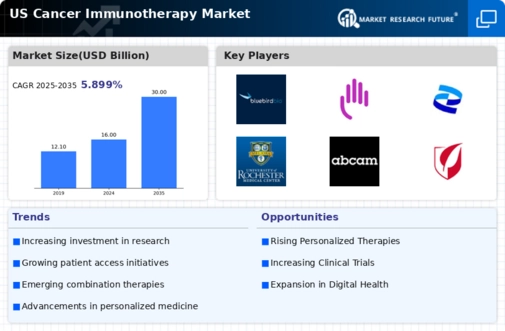The US Cancer Immunotherapy Market has emerged as one of the most dynamic and competitive arenas within the pharmaceutical and biotechnology sectors. The drive towards cancer therapeutics has shifted towards immunotherapies, which harness the body's immune system to fight cancer cells. This approach has yielded promising results, leading to heightened research and development efforts, collaborative ventures, and increased investments by major market players. As new treatments and technologies continue to evolve, the competitive landscape is characterized by rapid innovation, strategic alliances, and rigorous clinical trials. The landscape is also shaped by stringent regulatory policies and ever-changing treatment paradigms, which require companies to adapt quickly to maintain market relevance and optimize their product offerings. bluebird bio has established a noteworthy presence within the US Cancer Immunotherapy Market, primarily focusing on developing and delivering transformative gene therapies for cancer treatment. The company has harnessed its expertise in the development of cellular therapies, which have shown promising efficacy in clinical settings. bluebird bio benefits from its strong scientific foundation and pipeline management, which allows it to capitalize on breakthrough therapies that differentiate it from competitors. Its internal capabilities in gene editing technologies contribute to its competitive advantage, positioning it as a frontrunner in addressing challenging cancer types. Collaborative partnerships within the research community further bolster bluebird bio's ability to innovate and maintain relevance in a rapidly evolving market. BristolMyers Squibb holds a commanding position in the US Cancer Immunotherapy Market, backed by its extensive portfolio of innovative drugs and therapies targeting various types of cancer. The company's key products include immune checkpoint inhibitors and other advanced therapeutics that have demonstrated significant clinical success. BristolMyers Squibb has a robust market presence supported by its vast distribution network and well-established relationships with healthcare providers. The firm's strengths lie in its commitment to ongoing research and development, leading to pivotal breakthroughs in cancer treatment. Notably, BristolMyers Squibb has engaged in strategic mergers and acquisitions that have expanded its capabilities and product offerings, enabling it to remain competitive in a rapidly changing market landscape. Its continuous efforts to develop new therapies further strengthen its position and ensure it remains at the forefront of cancer immunotherapy developments in the US.





















